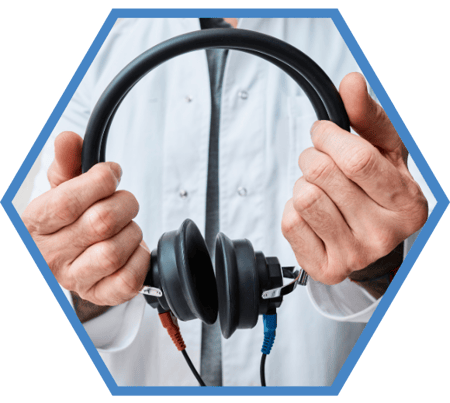HEARING SCREENINGS
Hearing rest before screening
Recommended by best practices

By Jules Pouzot | Operations Manager
Before undergoing a hearing test, we recommend that you take a rest period. At Bertrand-Johnson Acoustics (BJA), we insist on this essential step to ensure accurate results in line with good practice. This recommendation is in line with the directives of the CNESST (Commission des normes, de l'équité, de la santé et de la sécurité du travail), which oversees the protection of workers' health.
The importance of hearing rest
Hearing rest involves avoiding exposure to loud or prolonged noise for a period of 12 to 14 hours prior to a hearing test. According to good practices recommended by the CNESST, this allows the ear to recover after exposure to noise, ensuring reliable results that are representative of the worker's actual hearing ability. Without this rest, results could be influenced by temporary hearing fatigue, giving the impression of a hearing loss that is not permanent.
The right reflexes to adopt
To ensure accurate results from your hearing tests, here are some tips to follow:
- Respect the 12 to 14 hours' hearing rest recommended by the CNESST before the test.
- Inform employees of the importance of this rest and ensure that they observe it, especially those working in noisy environments.
- Avoid any exposure to high noise levels before the test, such as using noisy equipment or taking part in activities that may cause hearing fatigue. For example, the sound of the car radio before arriving at work.
The challenges of working before a hearing test
Working in a noisy environment before a hearing test, without respecting the recommended rest period, can distort the results. This can mask the worker's true hearing condition, or falsely indicate a temporary hearing loss. What's more, incorrect results can lead to inappropriate preventive measures, potentially endangering employees' hearing health.
How do you protect yourself if you can't rest your ears?
In certain situations, it may be impossible to respect the hearing rest period, particularly if an employee has to work in a noisy environment prior to his or her test. Here are a few tips on how to minimize the impact on hearing and best protect workers in these conditions:
- Use appropriate hearing protection: Wear customized earplugs or earmuffs to reduce noise exposure .
- Limit noise exposure as much as possible: If you have to work before the test, try to limit periods of noise exposure by taking regular breaks in quiet areas.
- Inform your supervisor or medical team: If you have not been able to take your hearing rest, it is important to report this before the test. This allows the audiologist to take this information into account when interpreting the results.
- Reschedule test if necessary: If the hearing rest conditions have not been met, it may be advisable to reschedule the test within a reasonable timeframe to obtain more reliable results.
Protect your employees' hearing health
At BJA, we follow the best practices recommended by the CNESST to guarantee your employees' hearing protection. By respecting hearing rest periods before testing, or by applying the necessary protective measures, you can be sure of having accurate data and implementing the right preventive measures.


Measure the impact of noise with our hearing screenings
Hearing screenings are essential for assessing employees' hearing health on hiring, leaving and periodically. In this way, you can analyze the impact of noise on employees' hearing in your work environment, and take remedial action.

-1.png?width=144&height=72&name=BJA%20_%20Logo%20Color%20%20(1)-1.png)